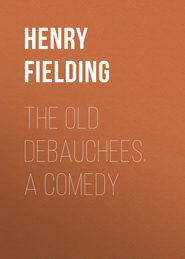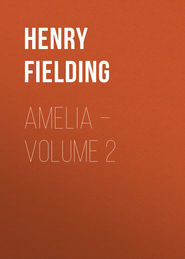По всем вопросам обращайтесь на: info@litportal.ru
(©) 2003-2024.
✖
The Works of Henry Fielding, vol. 11
Настройки чтения
Размер шрифта
Высота строк
Поля
The sum he brought home with him consisted of near six thousand pounds, all in specie, and most of it in that coin which Portugal distributes so liberally over Europe.
He was not yet old enough to be past all sense of pleasure, nor so puffed up with the pride of his good fortune as to overlook his old acquaintances the journeymen taylors, from among whom he had been formerly pressed into the sea-service, and, having there laid the foundation of his future success by his shares in prizes, had afterwards become captain of a trading vessel, in which he purchased an interest, and had soon begun to trade in the honourable manner above mentioned.
The captain now took up his residence at an ale-house in Drury-lane, where, having all his money by him in a trunk, he spent about five pounds a day among his old friends the gentlemen and ladies of those parts.
The merchant of Liverpool, having luckily had notice from a friend during the blaze of his fortune, did, by the assistance of a justice of peace, without the assistance of the law, recover his whole loss. The captain, however, wisely chose to refund no more; but, perceiving with what hasty strides Envy was pursuing his fortune, he took speedy means to retire out of her reach, and to enjoy the rest of his wealth in an inglorious obscurity; nor could the same justice overtake him time enough to assist a second merchant as he had done the first.
This was a very extraordinary case, and the more so as the ingenious gentleman had steered entirely clear of all crimes in our law.
Now, how it comes about that a robbery so very easy to be committed, and to which there is such immediate temptation always before the eyes of these fellows, should receive the encouragement of impunity, is to be accounted for only from the oversight of the legislature, as that oversight can only be, I think, derived from the reasons I have assigned for it.
But I will dwell no longer on this subject. If what I have here said should seem of sufficient consequence to engage the attention of any man in power, and should thus be the means of applying any remedy to the most inveterate evils, at least, I have obtained my whole desire, and shall have lain so long wind-bound in the ports of this kingdom to some purpose. I would, indeed, have this work – which, if I should live to finish it, a matter of no great certainty, if indeed of any great hope to me, will be probably the last I shall ever undertake – to produce some better end than the mere diversion of the reader.
Monday.– This day our captain went ashore, to dine with a gentleman who lives in these parts, and who so exactly resembles the character given by Homer of Axylus, that the only difference I can trace between them is, the one, living by the highway, erected his hospitality chiefly in favour of land-travellers; and the other, living by the water-side, gratified his humanity by accommodating the wants of the mariner.
In the evening our commander received a visit from a brother bashaw, who lay wind-bound in the same harbour. This latter captain was a Swiss. He was then master of a vessel bound to Guinea, and had formerly been a privateering, when our own hero was employed in the same laudable service. The honesty and freedom of the Switzer, his vivacity, in which he was in no respect inferior to his near neighbours the French, the aukward and affected politeness, which was likewise of French extraction, mixed with the brutal roughness of the English tar – for he had served under the colours of this nation and his crew had been of the same – made such an odd variety, such a hotchpotch of character, that I should have been much diverted with him, had not his voice, which was as loud as a speaking-trumpet, unfortunately made my head ach. The noise which he conveyed into the deaf ears of his brother captain, who sat on one side of him, the soft addresses with which, mixed with aukward bows, he saluted the ladies on the other, were so agreeably contrasted, that a man must not only have been void of all taste of humour, and insensible of mirth, but duller than Cibber is represented in the Dunciad, who could be unentertained with him a little while; for, I confess, such entertainments should always be very short, as they are very liable to pall. But he suffered not this to happen at present; for, having given us his company a quarter of an hour only, he retired, after many apologies for the shortness of his visit.
Tuesday.– The wind being less boisterous than it had hitherto been since our arrival here, several fishing-boats, which the tempestuous weather yesterday had prevented from working, came on board us with fish. This was so fresh, so good in kind, and so very cheap, that we supplied ourselves in great numbers, among which were very large soles at fourpence a pair, and whitings of almost a preposterous size at ninepence a score.
The only fish which bore any price was a john dorée, as it is called. I bought one of at least four pounds weight for as many shillings. It resembles a turbot in shape, but exceeds it in firmness and flavour. The price had the appearance of being considerable when opposed to the extraordinary cheapness of others of value, but was, in truth, so very reasonable when estimated by its goodness, that it left me under no other surprise than how the gentlemen of this country, not greatly eminent for the delicacy of their taste, had discovered the preference of the dorée to all other fish: but I was informed that Mr Quin, whose distinguishing tooth hath been so justly celebrated, had lately visited Plymouth, and had done those honours to the dorée which are so justly due to it from that sect of modern philosophers who, with Sir Epicure Mammon, or Sir Epicure Quin, their head, seem more to delight in a fish-pond than in a garden, as the old Epicureans are said to have done.
Unfortunately for the fishmongers of London, the dorée resides only in those seas; for, could any of this company but convey one to the temple of luxury under the Piazza, where Macklin the high-priest daily serves up his rich offerings to that goddess, great would be the reward of that fishmonger, in blessings poured down upon him from the goddess, as great would his merit be towards the high-priest, who could never be thought to overrate such valuable incense.
And here, having mentioned the extreme cheapness of fish in the Devonshire sea, and given some little hint of the extreme dearness with which this commodity is dispensed by those who deal in it in London, I cannot pass on without throwing forth an observation or two, with the same view with which I have scattered my several remarks through this voyage, sufficiently satisfied in having finished my life, as I have probably lost it, in the service of my country, from the best of motives, though it should be attended with the worst of success. Means are always in our power; ends are very seldom so.
Of all the animal foods with which man is furnished, there are none so plenty as fish. A little rivulet, that glides almost unperceived through a vast tract of rich land, will support more hundreds with the flesh of its inhabitants than the meadow will nourish individuals. But if this be true of rivers, it is much truer of the seashores, which abound with such immense variety of fish that the curious fisherman, after he hath made his draught, often culls only the daintiest part and leaves the rest of his prey to perish on the shore.
If this be true it would appear, I think, that there is nothing which might be had in such abundance, and consequently so cheap, as fish, of which Nature seems to have provided such inexhaustible stores with some peculiar design. In the production of terrestrial animals she proceeds with such slowness, that in the larger kind a single female seldom produces more than one a-year, and this again requires three, four, or five years more to bring it to perfection. And though the lesser quadrupeds, those of the wild kind particularly, with the birds, do multiply much faster, yet can none of these bear any proportion with the aquatic animals, of whom every female matrix is furnished with an annual offspring almost exceeding the power of numbers, and which, in many instances at least, a single year is capable of bringing to some degree of maturity.
What then ought in general to be so plentiful, what so cheap, as fish? What then so properly the food of the poor? So in many places they are, and so might they always be in great cities, which are always situated near the sea, or on the conflux of large rivers. How comes it then, to look no farther abroad for instances, that in our city of London the case is so far otherwise that, except that of sprats, there is not one poor palate in a hundred that knows the taste of fish?
It is true indeed that this taste is generally of such excellent flavour that it exceeds the power of French cookery to treat the palates of the rich with anything more exquisitely delicate; so that was fish the common food of the poor it might put them too much upon an equality with their betters in the great article of eating, in which, at present, in the opinion of some, the great difference in happiness between man and man consists. But this argument I shall treat with the utmost disdain: for if ortolans were as big as bustards, and at the same time as plenty as sparrows, I should hold it yet reasonable to indulge the poor with the dainty, and that for this cause especially, that the rich would soon find a sparrow, if as scarce as an ortolan, to be much the greater, as it would certainly be the rarer, dainty of the two.
Vanity or scarcity will be always the favourite of luxury; but honest hunger will be satisfied with plenty. Not to search deeper into the cause of the evil, I should think it abundantly sufficient to propose the remedies of it. And, first, I humbly submit the absolute necessity of immediately hanging all the fishmongers within the bills of mortality; and, however it might have been some time ago the opinion of mild and temporizing men that the evil complained of might be removed by gentler methods, I suppose at this day there are none who do not see the impossibility of using such with any effect. Cuncta prius tentanda might have been formerly urged with some plausibility, but cuncta prius tentata may now be replied: for surely, if a few monopolizing fishmongers could defeat that excellent scheme of the Westminster market, to the erecting which so many justices of peace, as well as other wise and learned men, did so vehemently apply themselves, that they might be truly said not only to have laid the whole strength of their heads, but of their shoulders too, to the business, it would be a vain endeavour for any other body of men to attempt to remove so stubborn a nusance.
If it should be doubted whether we can bring this case within the letter of any capital law now subsisting, I am ashamed to own it cannot; for surely no crime better deserves such punishment; but the remedy may, nevertheless, be immediate; and if a law was made at the beginning of next session, to take place immediately, by which the starving thousands of poor was declared to be felony, without benefit of clergy, the fishmongers would be hanged before the end of the session.
A second method of filling the mouths of the poor, if not with loaves at least with fishes, is to desire the magistrates to carry into execution one at least out of near a hundred acts of parliament, for preserving the small fry of the river of Thames, by which means as few fish would satisfy thousands as may now be devoured by a small number of individuals. But while a fisherman can break through the strongest meshes of an act of parliament, we may be assured he will learn so to contrive his own meshes that the smallest fry will not be able to swim through them.
Other methods may, we doubt not, be suggested by those who shall attentively consider the evil here hinted at; but we have dwelt too long on it already, and shall conclude with observing that it is difficult to affirm whether the atrocity of the evil itself, the facility of curing it, or the shameful neglect of the cure, be the more scandalous or more astonishing.
After having, however, gloriously regaled myself with this food, I was washing it down with some good claret with my wife and her friend, in the cabin, when the captain’s valet-de-chambre, head cook, house and ship steward, footman in livery and out on’t, secretary and fore-mast man, all burst into the cabin at once, being, indeed, all but one person, and, without saying by your leave, began to pack half a hogshead of small beer in bottles, the necessary consequence of which must have been either a total stop to conversation at that chearful season when it is most agreeable, or the admitting that polyonymous officer aforesaid to the participation of it. I desired him therefore to delay his purpose a little longer, but he refused to grant my request; nor was he prevailed on to quit the room till he was threatened with having one bottle to pack more than his number, which then happened to stand empty within my reach.
With these menaces he retired at last, but not without muttering some menaces on his side, and which, to our great terror, he failed not to put into immediate execution.
Our captain was gone to dinner this day with his Swiss brother; and, though he was a very sober man, was a little elevated with some champagne, which, as it cost the Swiss little or nothing, he dispensed at his table more liberally than our hospitable English noblemen put about those bottles, which the ingenious Peter Taylor teaches a led captain to avoid by distinguishing by the name of that generous liquor, which all humble companions are taught to postpone to the flavour of methuen, or honest port.
While our two captains were thus regaling themselves, and celebrating their own heroic exploits with all the inspiration which the liquor, at least, of wit could afford them, the polyonymous officer arrived, and, being saluted by the name of Honest Tom, was ordered to sit down and take his glass before he delivered his message; for every sailor is by turns his captain’s mate over a cann, except only that captain bashaw who presides in a man-of-war, and who upon earth has no other mate, unless it be another of the same bashaws.
Tom had no sooner swallowed his draught than he hastily began his narrative, and faithfully related what had happened on board our ship; we say faithfully, though from what happened it may be suspected that Tom chose to add perhaps only five or six immaterial circumstances, as is always I believe the case, and may possibly have been done by me in relating this very story, though it happened not many hours ago.
No sooner was the captain informed of the interruption which had been given to his officer, and indeed to his orders, for he thought no time so convenient as that of his absence for causing any confusion in the cabin, than he leapt with such haste from his chair that he had like to have broke his sword, with which he always begirt himself when he walked out of his ship, and sometimes when he walked about in it; at the same time, grasping eagerly that other implement called a cockade, which modern soldiers wear on their helmets with the same view as the antients did their crests – to terrify the enemy, he muttered something, but so inarticulately that the word damn was only intelligible; he then hastily took leave of the Swiss captain, who was too well bred to press his stay on such an occasion, and leapt first from the ship to his boat, and then from his boat to his own ship, with as much fierceness in his looks as he had ever expressed on boarding his defenceless prey in the honourable calling of a privateer.
Having regained the middle deck, he paused a moment while Tom and others loaded themselves with bottles, and then descending into the cabin exclaimed with a thundering voice, “D – n me, why arn’t the bottles stoed in, according to my orders?”
I answered him very mildly that I had prevented his man from doing it, as it was at an inconvenient time to me, and as in his absence, at least, I esteemed the cabin to be my own. “Your cabin!” repeated he many times; “no, d – n me! ’tis my cabin. Your cabin! d – n me! I have brought my hogs to a fair market. I suppose indeed you think it your cabin, and your ship, by your commanding in it; but I will command in it, d – n me! I will shew the world I am the commander, and nobody but I! Did you think I sold you the command of my ship for that pitiful thirty pounds? I wish I had not seen you nor your thirty pounds aboard of her.” He then repeated the words thirty pounds often, with great disdain, and with a contempt which I own the sum did not seem to deserve in my eye, either in itself or on the present occasion; being, indeed, paid for the freight of – weight of human flesh, which is above fifty per cent. dearer than the freight of any other luggage, whilst in reality it takes up less room; in fact, no room at all.
In truth, the sum was paid for nothing more than for a liberty to six persons (two of them servants) to stay on board a ship while she sails from one port to another, every shilling of which comes clear into the captain’s pocket. Ignorant people may perhaps imagine, especially when they are told that the captain is obliged to sustain them, that their diet at least is worth something, which may probably be now and then so far the case as to deduct a tenth part from the neat profits on this account; but it was otherwise at present; for when I had contracted with the captain at a price which I by no means thought moderate, I had some content in thinking I should have no more to pay for my voyage; but I was whispered that it was expected the passengers should find themselves in several things; such as tea, wine, and such like; and particularly that gentlemen should stowe of the latter a much larger quantity than they could use, in order to leave the remainder as a present to the captain at the end of the voyage; and it was expected likewise that gentlemen should put aboard some fresh stores, and the more of such things were put aboard the welcomer they would be to the captain.
I was prevailed with by these hints to follow the advice proposed; and accordingly, besides tea and a large hamper of wine, with several hams and tongues, I caused a number of live chickens and sheep to be conveyed aboard; in truth, treble the quantity of provisions which would have supported the persons I took with me, had the voyage continued three weeks, as it was supposed, with a bare possibility, it might.
Indeed it continued much longer; but as this was occasioned by our being wind-bound in our own ports, it was by no means of any ill consequence to the captain, as the additional stores of fish, fresh meat, butter, bread, &c., which I constantly laid in, greatly exceeded the consumption, and went some way in maintaining the ship’s crew. It is true I was not obliged to do this; but it seemed to be expected; for the captain did not think himself obliged to do it, and I can truly say I soon ceased to expect it of him. He had, I confess, on board a number of fowls and ducks sufficient for a West India voyage; all of them, as he often said, “Very fine birds, and of the largest breed.” This I believe was really the fact, and I can add that they were all arrived at the full perfection of their size. Nor was there, I am convinced, any want of provisions of a more substantial kind; such as dried beef, pork, and fish; so that the captain seemed ready to perform his contract, and amply to provide for his passengers. What I did then was not from necessity, but, perhaps, from a less excusable motive, and was by no means chargeable to the account of the captain.
But, let the motive have been what it would, the consequence was still the same; and this was such that I am firmly persuaded the whole pitiful thirty pounds came pure and neat into the captain’s pocket, and not only so, but attended with the value of ten pound more in sundries into the bargain. I must confess myself therefore at a loss how the epithet pitiful came to be annexed to the above sum; for, not being a pitiful price for what it was given, I cannot conceive it to be pitiful in itself; nor do I believe it is thought by the greatest men in the kingdom; none of whom would scruple to search for it in the dirtiest kennel, where they had only a reasonable hope of success.
How, therefore, such a sum should acquire the idea of pitiful in the eyes of the master of a ship seems not easy to be accounted for; since it appears more likely to produce in him ideas of a different kind. Some men, perhaps, are no more sincere in the contempt for it which they express than others in their contempt of money in general; and I am the rather inclined to this persuasion, as I have seldom heard of either who have refused or refunded this their despised object. Besides, it is sometimes impossible to believe these professions, as every action of the man’s life is a contradiction to it. Who can believe a tradesman who says he would not tell his name for the profit he gets by he selling such a parcel of goods, when he hath told a thousand lies in order to get it?
Pitiful, indeed, is often applied to an object not absolutely, but comparatively with our expectations, or with a greater object: in which sense it is not easy to set any bounds to the use of the word. Thus, a handful of halfpence daily appear pitiful to a porter, and a handful of silver to a drawer. The latter, I am convinced, at a polite tavern, will not tell his name (for he will not give you any answer) under the price of gold. And in this sense thirty pound may be accounted pitiful by the lowest mechanic.
One difficulty only seems to occur, and that is this, how comes it that, if the profits of the meanest arts are so considerable, the professors of them are not richer than we generally see them? One answer to this shall suffice. Men do not become rich by what they get, but by what they keep. He who is worth no more than his annual wages or salary, spends the whole; he will be always a beggar let his income be what it will, and so will be his family when he dies. This we see daily to be the case of ecclesiastics, who, during their lives, are extremely well provided for, only because they desire to maintain the honour of the cloth by living like gentlemen, which would, perhaps, be better maintained by living unlike them.
But, to return from so long a digression, to which the use of so improper an epithet gave occasion, and to which the novelty of the subject allured, I will make the reader amends by concisely telling him that the captain poured forth such a torrent of abuse that I very hastily and very foolishly resolved to quit the ship. I gave immediate orders to summon a hoy to carry me that evening to Dartmouth, without considering any consequence. Those orders I gave in no very low voice, so that those above stairs might possibly conceive there was more than one master in the cabin. In the same tone I likewise threatened the captain with that which, he afterwards said, he feared more than any rock or quicksand. Nor can we wonder at this when we are told he had been twice obliged to bring to and cast anchor there before, and had neither time escaped without the loss of almost his whole cargo.
The most distant sound of law thus frightened a man who had often, I am convinced, heard numbers of cannon roar round him with intrepidity. Nor did he sooner see the hoy approaching the vessel than he ran down again into the cabin, and, his rage being perfectly subsided, he tumbled on his knees, and a little too abjectly implored for mercy.
I did not suffer a brave man and an old man to remain a moment in this posture, but I immediately forgave him.
And here, that I may not be thought the sly trumpeter of my own praises, I do utterly disclaim all praise on the occasion. Neither did the greatness of my mind dictate, nor the force of my Christianity exact, this forgiveness. To speak truth, I forgave him from a motive which would make men much more forgiving if they were much wiser than they are, because it was convenient for me so to do.
Wednesday.– This morning the captain drest himself in scarlet in order to pay a visit to a Devonshire squire, to whom a captain of a ship is a guest of no ordinary consequence, as he is a stranger and a gentleman, who hath seen a great deal of the world in foreign parts, and knows all the news of the times.
The squire, therefore, was to send his boat for the captain, but a most unfortunate accident happened; for, as the wind was extremely rough and against the hoy, while this was endeavouring to avail itself of great seamanship in hawling up against the wind, a sudden squall carried off sail and yard, or at least so disabled them that they were no longer of any use and unable to reach the ship; but the captain, from the deck, saw his hopes of venison disappointed, and was forced either to stay on board his ship, or to hoist forth his own long-boat, which he could not prevail with himself to think of, though the smell of the venison had had twenty times its attraction. He did, indeed, love his ship as his wife, and his boats as children, and never willingly trusted the latter, poor things! to the dangers of the seas.
To say truth, notwithstanding the strict rigour with which he preserved the dignity of his station, and the hasty impatience with which he resented any affront to his person or orders, disobedience to which he could in no instance brook in any person on board, he was one of the best natured fellows alive. He acted the part of a father to his sailors; he expressed great tenderness for any of them when ill, and never suffered any the least work of supererogation to go unrewarded by a glass of gin. He even extended his humanity, if I may so call it, to animals, and even his cats and kittens had large shares in his affections. An instance of which we saw this evening, when the cat, which had shewn it could not be drowned, was found suffocated under a feather-bed in the cabin. I will not endeavour to describe his lamentations with more prolixity than barely by saying they were grievous, and seemed to have some mixture of the Irish howl in them. Nay, he carried his fondness even to inanimate objects, of which we have above set down a pregnant example in his demonstration of love and tenderness towards his boats and ship. He spoke of a ship which he had commanded formerly, and which was long since no more, which he had called the Princess of Brazil, as a widower of a deceased wife. This ship, after having followed the honest business of carrying goods and passengers for hire many years, did at last take to evil courses and turn privateer, in which service, to use his own words, she received many dreadful wounds, which he himself had felt as if they had been his own.
Thursday.– As the wind did not yesterday discover any purpose of shifting, and the water in my belly grew troublesome and rendered me short-breathed, I began a second time to have apprehensions of wanting the assistance of a trochar when none was to be found; I therefore concluded to be tapped again by way of precaution, and accordingly I this morning summoned on board a surgeon from a neighbouring parish, one whom the captain greatly recommended, and who did indeed perform his office with much dexterity. He was, I believe, likewise a man of great judgment and knowledge in the profession; but of this I cannot speak with perfect certainty, for, when he was going to open on the dropsy at large and on the particular degree of the distemper under which I laboured, I was obliged to stop him short, for the wind was changed, and the captain in the utmost hurry to depart; and to desire him, instead of his opinion, to assist me with his execution.
I was now once more delivered from my burthen, which was not indeed so great as I had apprehended, wanting two quarts of what was let out at the last operation.
While the surgeon was drawing away my water the sailors were drawing up the anchor; both were finished at the same time; we unfurled our sails and soon passed the Berry-head, which forms the mouth of the bay.
We had not however sailed far when the wind, which had, though with a slow pace, kept us company about six miles, suddenly turned about, and offered to conduct us back again; a favour which, though sorely against the grain, we were obliged to accept.
Nothing remarkable happened this day; for as to the firm persuasion of the captain that he was under the spell of witchcraft, I would not repeat it too often, though indeed he repeated it an hundred times every day; in truth, he talked of nothing else, and seemed not only to be satisfied in general of his being bewitched, but actually to have fixed with good certainty on the person of the witch, whom, had he lived in the days of Sir Matthew Hale, he would have infallibly indicted, and very possibly have hanged, for the detestable sin of witchcraft; but that law, and the whole doctrine that supported it, are now out of fashion; and witches, as a learned divine once chose to express himself, are put down by act of parliament. This witch, in the captain’s opinion, was no other than Mrs Francis of Ryde, who, as he insinuated, out of anger to me for not spending more money in her house than she could produce anything to exchange for, or any pretence to charge for, had laid this spell on his ship.
Though we were again got near our harbour by three in the afternoon, yet it seemed to require a full hour or more before we could come to our former place of anchoring, or berth, as the captain called it. On this occasion we exemplified one of the few advantages which the travellers by water have over the travellers by land. What would the latter often give for the sight of one of those hospitable mansions where he is assured that there is good entertainment for man and horse; and where both may consequently promise themselves to assuage that hunger which exercise is so sure to raise in a healthy constitution.
At their arrival at this mansion, how much happier is the state of the horse than that of the master! The former is immediately led to his repast, such as it is, and, whatever it is, he falls to it with appetite. But the latter is in a much worse situation. His hunger, however violent, is always in some degree delicate, and his food must have some kind of ornament, or, as the more usual phrase is, of dressing, to recommend it. Now all dressing requires time, and therefore, though perhaps the sheep might be just killed before you came to the inn, yet in cutting him up, fetching the joint, which the landlord by mistake said he had in the house, from the butcher at two miles’ distance, and afterwards warming it a little by the fire, two hours at least must be consumed, while hunger, for want of better food, preys all the time on the vitals of the man.












